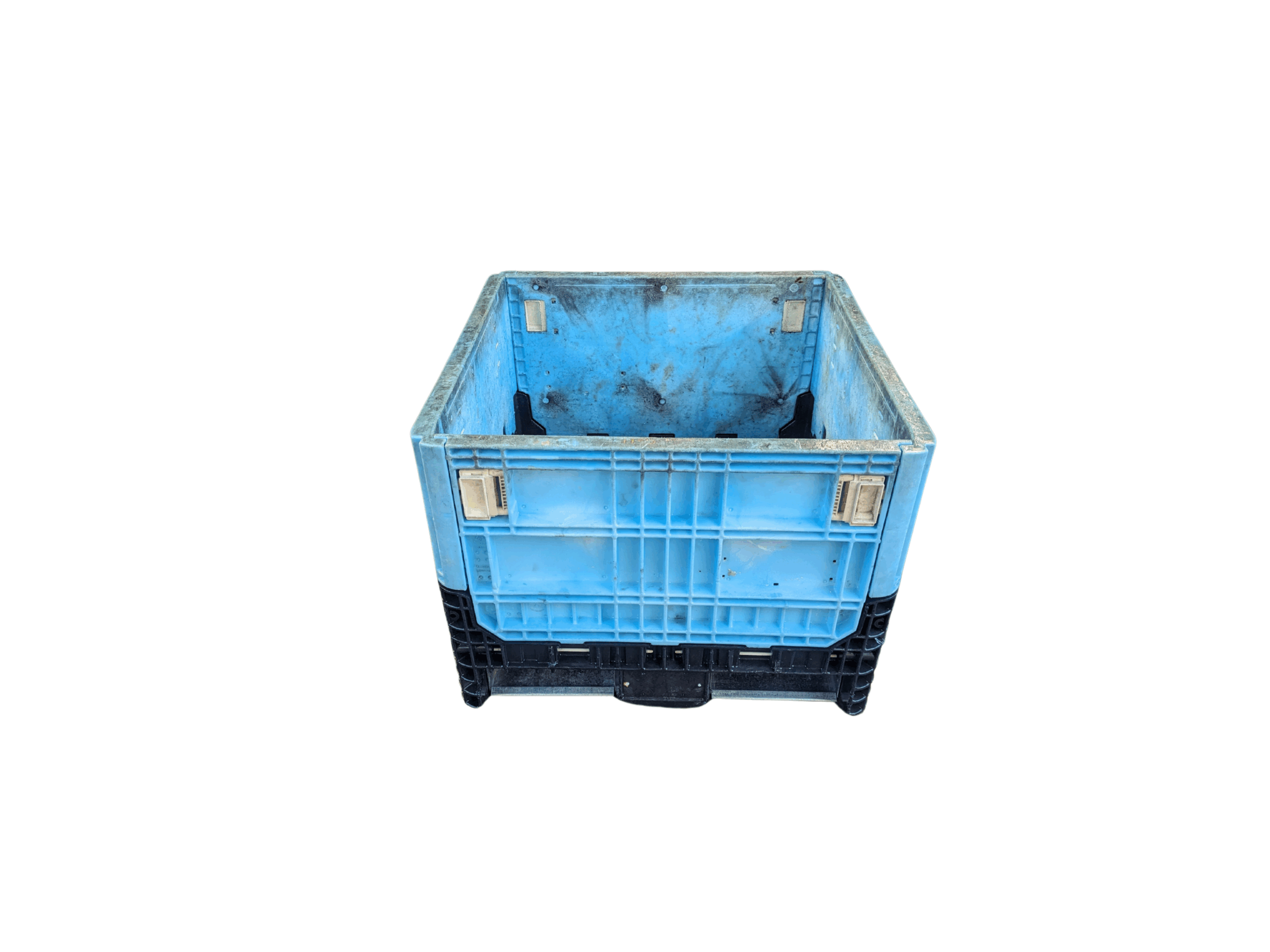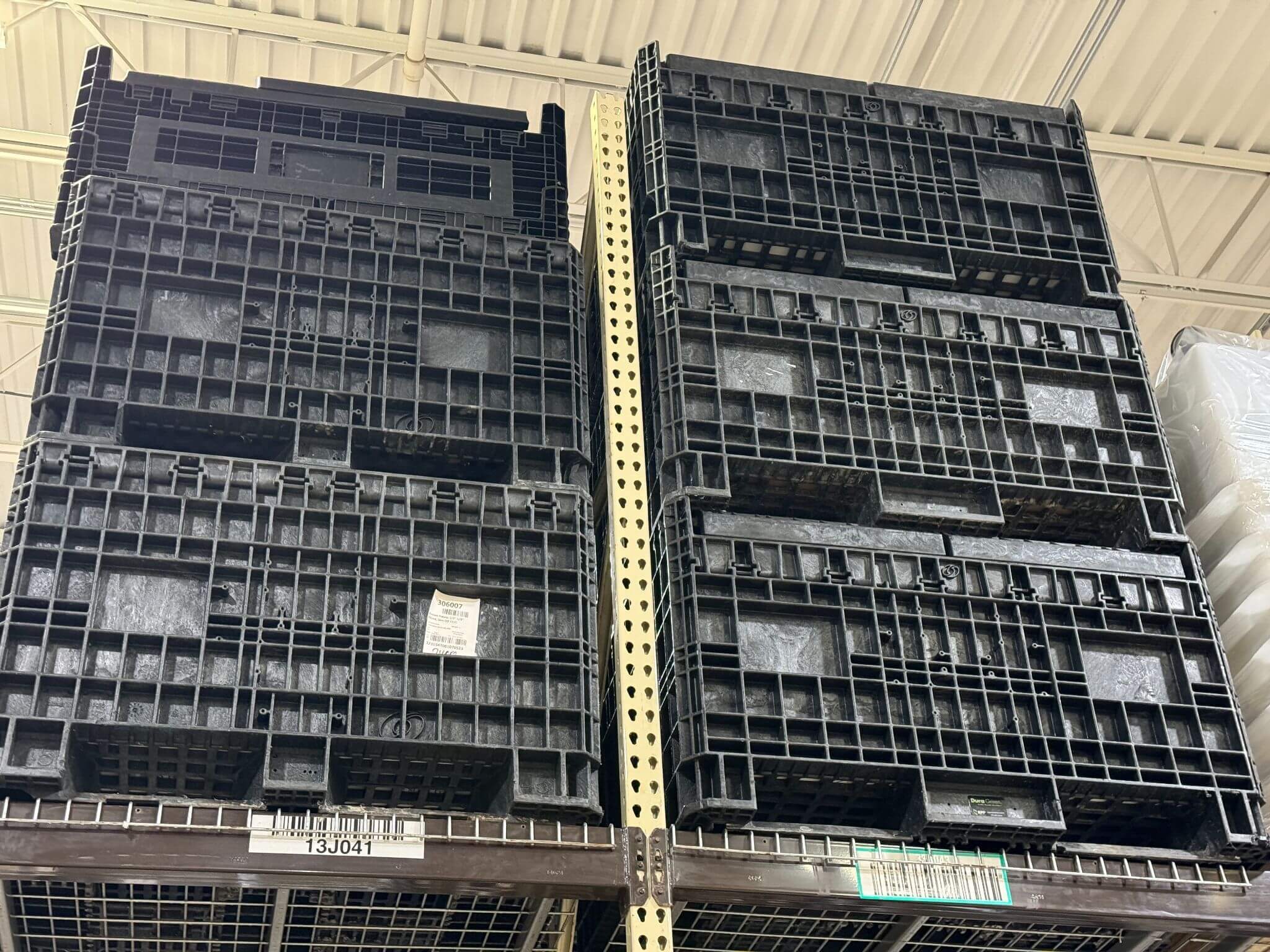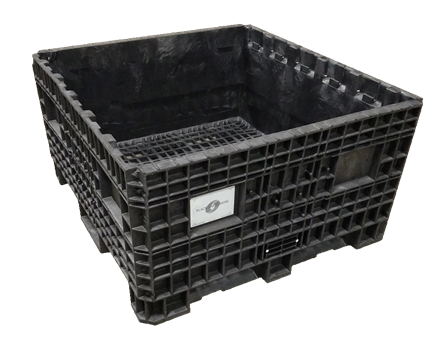Why refurbished bulk containers are eco-friendly solutions for sustainable businesses
Wiki Article
Why Bulk Containers Are Vital for Sustainable and Affordable Transport
Bulk containers play an important function in modern logistics. They facilitate the effective activity of big amounts of items, therefore maximizing transport procedures. This technique not just lowers costs however likewise decreases ecological impact via lower exhausts and waste generation. As markets seek even more lasting methods, the adoption of mass containers is becoming progressively substantial. What effects does this change hold for future logistics and supply chain management?
The Advantages of Using Bulk Containers in Logistics
Bulk containers transform logistics by improving performance and sustainability. These containers permit the transportation of big amounts of items in a solitary journey, considerably minimizing the variety of trips called for. This not just streamlines operations but likewise lessens labor expenses linked with handling, loading, and unloading. On top of that, mass containers are made to maximize area usage within transportation cars, making sure that even more items can be shipped at the same time.The standardization of bulk containers likewise streamlines the logistics process. With uniform measurements, they can be quickly piled and saved, leading to improved warehouse administration. Bulk containers often include sturdy materials that safeguard materials from damage during transit, therefore decreasing item loss and enhancing general reliability. Because of this, organizations can experience boosted supply chain performance, eventually resulting in boosted earnings and consumer fulfillment. This mix of aspects makes mass containers an essential possession in modern logistics.
Environmental Effect: Decreasing Waste and Carbon Footprint
As industries significantly focus on sustainability, the adoption of mass containers has actually arised as a crucial technique for lowering waste and decreasing carbon footprints. These containers decrease making use of packaging materials, such as boxes and plastic, thereby notably lowering total waste generation. By settling shipments, bulk containers enhance transportation performance, enabling even more items to be delivered per journey. This decrease in trips straight correlates with lower greenhouse gas emissions, adding to a smaller sized carbon footprint.Additionally, mass containers can often be recycled or reused, further mitigating ecological influence. The sturdiness of these containers warranties they can hold up against several transportation cycles, minimizing the need for single-use alternatives. used bulk containers. By enhancing logistics and advertising reliable source usage, bulk containers not just sustain sustainable practices but additionally urge markets to align with global ecological objectives. Ultimately, their implementation mirrors a dedication to environmental stewardship and responsible resource administration
Price Savings: How Mass Containers Lower Transportation Expenditures
While lots of companies look for ways to boost their lower line, using bulk containers provides a substantial chance for decreasing transport expenses. Mass containers take full advantage of the volume of goods transported, enabling companies to deliver bigger quantities at when. This effectiveness reduces the variety of trips needed, straight decreasing fuel expenses and lessening labor expenditures related to loading and dumping.Additionally, bulk containers often feature structured styles that optimize space application within transport cars. This suggests fewer voids, leading to much more reliable use readily available capacity. The sturdiness of mass containers can lower the danger of product damages during transportation, reducing losses and making certain that more items arrive undamaged.
Enhancing Supply Chain Effectiveness With Bulk Storage Solutions
Bulk storage space services play an essential duty in improving supply chain effectiveness by maximizing inventory monitoring. By settling products right into fewer, larger containers, services can substantially minimize dealing with expenses connected with regular transfers and processing. This streamlined strategy permits far better tracking and management of inventory, eventually bring about boosted functional efficiency.Structured Stock Management
Reliable inventory management is necessary for optimizing supply chain procedures, specifically when companies embrace bulk storage remedies. These services allow companies to keep greater stock degrees while minimizing the regularity of replenishment. By combining products into bulk containers, firms can improve their supply processes, minimizing the complexity related to tracking numerous smaller sized packages. This approach promotes exact inventory counts and boosts projecting accuracy, enabling for more informed decision-making. On top of that, mass storage services simplify warehouse company, making it less complicated to find and accessibility products when required. Therefore, organizations can accomplish a more effective stock turnover price, eventually boosting overall supply chain performance and decreasing the likelihood of stockouts or overstock circumstances.
Reduced Handling Expenses
The execution of mass storage solutions not only streamlines supply management yet also considerably minimizes managing expenses throughout the supply chain. By combining materials into bulk containers, business lessen the demand for frequent handling and transfer in between different storage space and transport systems. This technique reduces labor expenses connected with loading, discharging, and moving smaller sized bundles. Additionally, bulk storage reduces the regularity of deliveries, resulting in reduced transportation prices and lowered gas consumption. Because of this, services can enhance their logistics operations, enabling a more reliable allowance of sources. Ultimately, minimized dealing with expenses add to improved total supply chain performance, fostering an environment that supports both sustainability and economic viability.
Adaptability of Bulk Containers Across Different Industries
Although several industries have distinct demands for transport and storage space, mass containers have actually emerged as a flexible option that fulfills a large range of demands. These containers, varying from huge containers to specialized containers, can suit diverse products, consisting of powders, granules, and fluids. In the agricultural sector, bulk containers assist in the transportation of grains and plant foods, while the food and beverage industry utilizes them for ingredients and ended up items. The chemical sector counts on bulk containers for securely moving dangerous materials, making sure conformity with security guidelines. In addition, building and construction firms profit from mass containers for transferring aggregates and various other materials. Their adaptability includes various settings of transport, including trains, trucks, and ships, boosting logistical effectiveness. This convenience not only streamlines operations across different sectors yet likewise promotes sustainability by decreasing packaging waste and maximizing room in transportation. As a result, mass containers play an essential role in modern-day supply chain administration.Future Trends in Mass Container Use and Sustainability
The future of bulk container use is progressively shaped by cutting-edge products development that boosts sustainability. In addition, automation in logistics guarantees to improve procedures, decreasing waste and boosting performance. Embracing round economic climate techniques will better reinvent just how bulk containers are designed, utilized, and reused, promoting an extra sustainable transport landscape.Innovative Products Development
As industries progressively focus on sustainability, innovative products development wholesale containers becomes a considerable variable in enhancing eco-friendly transportation services. Scientists and suppliers are exploring naturally degradable plastics, recycled compounds, and light-weight steels to reduce environmental impact. These materials not only lessen waste but likewise improve gas performance by lowering the overall weight of containers. In addition, developments in wise materials, which can adjust to varying problems, improve the resilience and performance of bulk containers. The assimilation of these ingenious materials aligns with circular economy concepts, advertising reuse and recycling. As the need for lasting practices grows, the growth of such materials will play a vital duty in shaping the future of mass container usage in logistics and transport.Automation in Logistics
Significant improvements in automation are poised to transform logistics and the usage of bulk containers, improving sustainability in transportation. Automated systems, including drones and independent cars, are streamlining the movement of mass containers, decreasing the reliance on standard fuel-powered transport. These innovations enhance directing and packing processes, minimizing vacant miles and enhancing fuel efficiency. In addition, automated supply monitoring systems boost monitoring and tracking of bulk containers, making sure much better resource allowance and minimized waste. The assimilation of the Net of Points (IoT) enables real-time data analysis, making it possible for proactive decision-making that straightens with sustainability objectives. As automation remains to develop, it is expected to drive better innovations wholesale container usage, ultimately sustaining more lasting logistics practices and reducing the ecological effect of transport.Round Economic Situation Practices
Developments in automation are establishing the stage for a much more integrated technique to circular economic situation methods in the domain name of mass container usage. As industries significantly embrace sustainability, mass containers are being developed for durability and reusability. This change not only reduces waste yet additionally enhances resource efficiency. Firms are adopting approaches such as closed-loop systems, where used containers are accumulated, reconditioned, and reestablished into the supply chain. Furthermore, smart innovations track container life cycles, helping with far better administration and decreasing ecological impact. The cooperation between suppliers, logistics suppliers, and end-users is essential in establishing standards for lasting container usage. used bulk containers. Future patterns suggest a growing focus on products that are biodegradable and recyclable, further strengthening the round economic climate's concepts wholesale transport
Often Asked Concerns
What Products Are Bulk Containers Typically Made From?
Mass containers are commonly created from resilient materials such as high-density polyethylene, steel, aluminum, and cardboard. These products give flexibility, toughness, and defense, making them ideal for delivering numerous goods in different industries successfully.How Do I Choose the Right Size Mass Container?
Selecting the ideal dimension bulk container includes examining the quantity of materials to be moved, taking into consideration handling devices compatibility, used bulk containers and evaluating storage space demands. Proper size warranties performance in transportation and reduces waste throughout delivery.Are Mass Containers Reusable or Recyclable?
Bulk containers are frequently recyclable, made for multiple trips, improving sustainability. Many can likewise be recycled, depending upon the products made use of. Picking recyclable options further supports environmental goals and minimizes waste in transportation practices.What Safety Regulations Apply to Bulk Container Transportation?
Security policies for mass container transport consist of compliance with the Department of Transportation guidelines, proper labeling of hazardous products, architectural honesty assessments, and adherence to weight limits to assure secure handling and prevent accidents during transit.How Can Businesses Shift to Making Use Of Mass Containers Efficiently?
Organizations can alter to bulk containers by evaluating present logistics, training personnel on handling, investing in ideal equipment, optimizing stock monitoring, and working together with suppliers to ensure compatibility and performance throughout the supply chain.
As markets increasingly prioritize sustainability, the adoption of mass containers has actually emerged as a crucial strategy for lowering waste and lowering carbon footprints. By combining products right into bulk containers, companies can simplify their inventory processes, minimizing the intricacy associated with tracking numerous smaller packages. As markets increasingly focus on sustainability, innovative products development in bulk containers emerges as a considerable variable in enhancing environment-friendly transport solutions. Automated systems, including drones and autonomous cars, are enhancing the motion of mass containers, minimizing the dependence on standard fuel-powered transportation. Furthermore, automated stock administration systems boost tracking and surveillance of mass containers, making certain better source allocation and reduced waste.
Report this wiki page